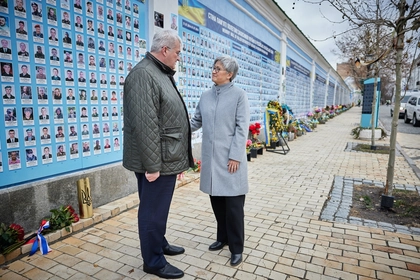Voters in the Georgian capital Tbilisi expressed diverging views on Saturday on whether their country should move closer to Europe or improve ties with Moscow.
"I want to live in Europe, not in Russia," said 18-year-old voter Alexandre Guldani.
JOIN US ON TELEGRAM
Follow our coverage of the war on the @Kyivpost_official.
"These elections are very important for me, especially given our country's current state of affairs," he said.
The opposition has cast the ballot as a make-or-break battle between joining the European Union and falling back into Moscow's orbit.
But the ruling party rejects this, accusing the opposition of risking confrontation with a country that waged war against Georgia in 2008 and dominated it for two centuries.
Georgia, a country of around four million people, was part of the Russian Empire and then the Soviet Union until its independence in 1991.
In 2008, it was invaded by the Russian army, whose forces still occupy a fifth of the country.
Other voters in the capital urged pragmatism in relations with Moscow, currently embroiled in a two-and-a-half-year invasion of Ukraine.
"We should be friends with Russia – and Europe," said Giga Abuladze, who works in a kindergarten run by the Orthodox Patriarchate in Tbilisi.
"There is an opposition and so be it but it mustn't be disruptive. We need to help each other," the 58-year-old said, praising Georgian Dream's billionaire founder Bidzina Ivanishvili.
Musicologist Suzanne Kassian said Georgia needed to find a "harmonious path between traditions and development."

Drones Strike High-Rise Buildings in Russia’s Kazan
"We can't choose our neighbors, so we have to be clear-headed about our geopolitical position," the 59-year-old said.
'I'm unsatisfied'
In power since 2012, Georgian Dream initially pursued a liberal pro-Western policy agenda.
But over the last two years the party has reversed course.
Its election campaign has centered on a conspiracy theory about a "global war party" that controls Western institutions and is seeking to drag Georgia into the Russia-Ukraine war.
Earlier this year, it unveiled plans to pass a constitutional ban on all major opposition parties if it wins a supermajority of seats in parliament.
"I'm very unsatisfied with the way things have been going for the last few years," said 19-year-old student Sergei.
If Georgian Dream wins, "they're going to rule out a lot of the parties that are now in opposition," he said.
He also expressed concern about new legislation in Georgia banning what the ruling party calls LGBTQ "propaganda," a measure that the European Union said jeopardized Georgia's path to joining the bloc.
"A lot of Georgians in rural areas just are anti-LGBTQ," said Sergei.
"They're utilizing that audience for a vote. It's an easy vote because I guess hate brings people together more than we think, unfortunately," he said.
Tamta Kukhaleishvili, a 38-year-old psychologist, said she was afraid that the government will not recognize the election results if the opposition wins – and that unrest could ensue.
She supports the opposition, criticizing the "foreign influence" legislation passed by the ruling party targeting civil society.
"If the pro-Russian side wins, I'll definitely be leaving Georgia. It's the first time in my life that I've really thought about it," she told AFP.
"Everything that has happened over the last few years shows that our country is moving towards Russia and against democracy, and I don't want to live in a country like that."
You can also highlight the text and press Ctrl + Enter






